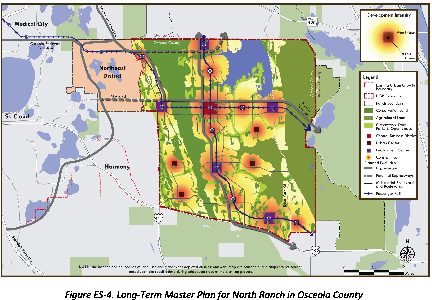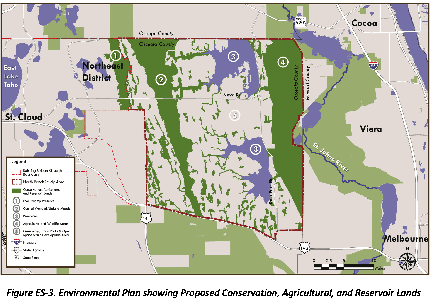Sierra Club Objects to Osceola County North Ranch Sector Plan

The Sierra Club Central Florida Group presented comments on the Deseret Ranches North Sector Plan. The Sierra Club believes this monstrous plan fails to facilitate protection of regionally significant resources, including, but not limited to, regionally significant water courses and wildlife corridors, as outlined in Section 163.3245 of Florida Statutes. We requested that the Osceola County Board of County Commissioners and its Planning Commission decide not to transmit the plan to the Florida State Department of Economic Opportunity.
We question how the County and the North Ranch will sustain the viability of natural resources and wildlife corridors of the North Ranch to the planning horizon of 2060-2080, while the Ranch operates as a working ranch consisting of cattle ranching, farming, hunting, and citrus production. Our objections to the plan are as follows:
Transportation: Establishment of new transportation corridors through conservation lands and rural/agricultural lands potentially diverts state and federal transportation funding from a more integrated transportation network to serve existing/approved development areas. Additionally, proposed expressways, such as the new Pineda Causeway link crossing the St. Johns River, will fragment sensitive ecosystems and intrude into public conservation lands of Brevard County. Alternatively, the Sierra Club recommends using existing bridge alignments at SR 520 and US 192.
Reservoir Resources: The plan states, "These water resources, in addition to providing valuable water supply, provide benefits to fish and wildlife resources, and add a lentic habitat type to the Environmental Plan." ("Lentic" habitat is characterized by standing or slow moving water.)
The Sierra Club objects to:
- The proposed expansion of the Taylor Creek Reservoir (7,104 acres) and the creation of the Pennywash/Wolf Creek Reservoir.
- Creating the decommissioned Pennywash/Wolf Creek Reservoir (5,548 acres) that will flood and destroy thousands of acres of freshwater forested wetlands. A similar plan proposed by the U.S. Army Corps of Engineers in the 1970's was finally rejected by the State of Florida, as noted in the Final Environmental Impact Statement of 1986.
- Upon receipt of authorization for construction, Pennywash/Wolf Creek acreage will be counted in the required agricultural land preservation requirement.
- The Sierra Club objects to these long-term water reservations, as they potentially impact the already stressed St. Johns River.

Policy 6.5: Conversion Ration for Conservation Easements and Agricultural Restrictions
Proposed "sprawl-like" development, including new transportation facilities, will fragment conservation lands and wildlife habitat. For every acre of land within a CMP/DSAP [Conceptual Master Plan/Detailed Specific Area Plan], a ratio of 0.508 conservation acres for every acre of developable land area and 0.238 acres of Agricultural Lands for every acre of developable land area, as identified in Map 5 (North Ranch Planning Area Environmental Plan), must be placed into a conservation easement or agricultural covenant. The Sierra Club recommends a greater ratio of conservation lands for every acre of developable land and objects to the inclusion of the proposed Pennywash/Wolf Creek Reservoir into the agricultural land preservation requirement.
The North Ranch includes portions of sensitive headwaters of the Upper Kissimmee River Basin, Econlockhatchee River Basin and the St. Johns River Basin. While the plan proposes to protect the Econlockhatchee River 100-year floodplain, there are no protections for developing within the St. Johns and Upper Kissimmee River 100-year floodplains. The proposed intensity of the North Ranch Sector Plan has the potential to significantly fragment and impact these natural resources as well as the sensitive ecosystems of Orange and Brevard Counties. The proposed North Ranch Sector Plan needs more scrutiny, including stakeholder input.
The Sierra Club respectfully requests the Osceola County Planning Commission consider the Sierra Club's recommendations not to transmit.
—Marjorie Holt, Chair/Conservation Chair, Sierra Club Central Florida Group